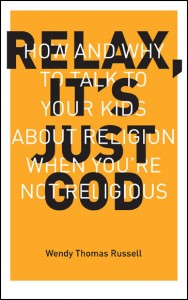Book Review: Relax, It’s Just God: How and Why to Talk to Your Kids about Religion When You’re Not Religious

Relax, It’s Just God (released today by Brown Paper Press) is a thought-provoking entry in the expanding category of secular parenting advice. It was written by Wendy Thomas Russell, an award-winning journalist who many will recognize as the brains behind Patheos’s Natural Wonderers parenting blog.
Relax, It’s Just God includes Russell’s analysis of data from an informal survey of 1,000 nonreligious parents and features frequent weigh-ins from secular Internet celebrities like Dale McGowan and Richard Wade. But where firebrand atheist Dan Arel’s Parenting Without God often had me cheering like an Amen! choir, Russell’s book is built around a more challenging premise: Should nonreligious parents teach religious tolerance by introducing their children to the tenets and mythologies of religions in which they themselves don’t believe?
An anecdote from Russell’s conclusion encapsulates the response that many nonbelievers are liable to have: “Shortly after I decided to write this book, I reached out to the communications director of an atheist group in New York. I told her about my project and asked her if I could interview some parents in her group about how they had gone about introducing their children to religion. Her response was short and curt. ‘As an atheist,’ she wrote, ‘I did not introduce my children to religion. And nobody I know [in this group] would introduce their children to religion.’”
My own intuitive reaction was more equivocal. As the child of former fundamentalists and a one-time Pentecostal believer, I’ve had regular discussions with my wife about how we should approach religion with our daughter, who is now nearly four years old. As a couple, we’ve drawn touchstones on the map to instilling religious awareness: my wife wants to revisit the Grand Canyon, so that our daughter can see for herself the geological eras carved in stone, and I’d like to read her Mary Renault’s novelization of the Greek mythology of Theseus, to illustrate the passage into obscurity of religions upon which people once staked their lives. When Bible discussions are introduced, we’ve agreed that they will center on similarities to earlier mythology, the Bible’s internal inconsistencies, and on investigating authorship claims and historical statements made in the Bible. We’ve also agreed that before our daughter sets foot in a church, she will be briefed on proselytizers’ routine deployment of social and emotional pressure and military-grade psychological coercion. In other words, our exact route might not be planned, but the destination is clear: we want our offspring fortified against being converted.
In Relax, It’s Just God, author Wendy Thomas Russell suggests potential problems with such an approach: “[I]n light of America’s secular boom, perhaps religion is not the threat we should be worried about; perhaps bigotry is. As parents on the front lines of this great shift, we have an opportunity to make sure that disbelief doesn’t translate into unkind, disdainful, or condescending comments about people who mean us no harm. Knowing ourselves and our biases, tamping down our inner vitriol, and maintaining some humility are crucial first steps.”
As someone who lives with the ongoing fallout of severe physical child abuse carried out on the advice of a Christian pastor, Russell’s casual handling of the harms and pitfalls of religion sometimes missed the mark for me. And as one who has already severed ties with my dysfunctional relatives, it was difficult for me to identify with Russell’s compulsion to make peace with still-devout extended family members. There were statements and suggestions in Russell’s book that I could never agree with. Still, the core message did resonate: my wife and I have shared week-long vacations with our homeschooling Baptist neighbors, who have never failed to be respectful of our open lack of religious belief; my wife keeps in contact with a college pal who is a hijab-wearing Muslim; and my Facebook friends include Christian authors, musicians, and pastors. My wife and I get along with our religious counterparts and even love them, in spite of significant differences.
Ultimately, what Wendy Thomas Russell points out is that in the absence of forethought and deliberate effort, nonbelievers may inadvertently inspire in their children the kind of mindless, mean-spirited intolerance that they’ve criticized from the devout. I think it’s a valid point and one that makes reading this little book well worth the time and effort.
Unlike some similar guides, Russell addresses her book to all of the “nones”—a category that includes parents who are atheist, agnostic, spiritual-but-not-religious, or even religious but unattached to a specific faith. She includes practical advice on a range of topics, from heading-off religiously motivated playground bullying to talking with un-churched children about death. Some of her points are bound to fall flat with those who are happily embedded in the bubble of atheist websites and social media, but as Russell so skillfully points out, now is the time for parents of “nones” to begin preparing their offspring to assume their roles as leaders of America’s rising majority.
